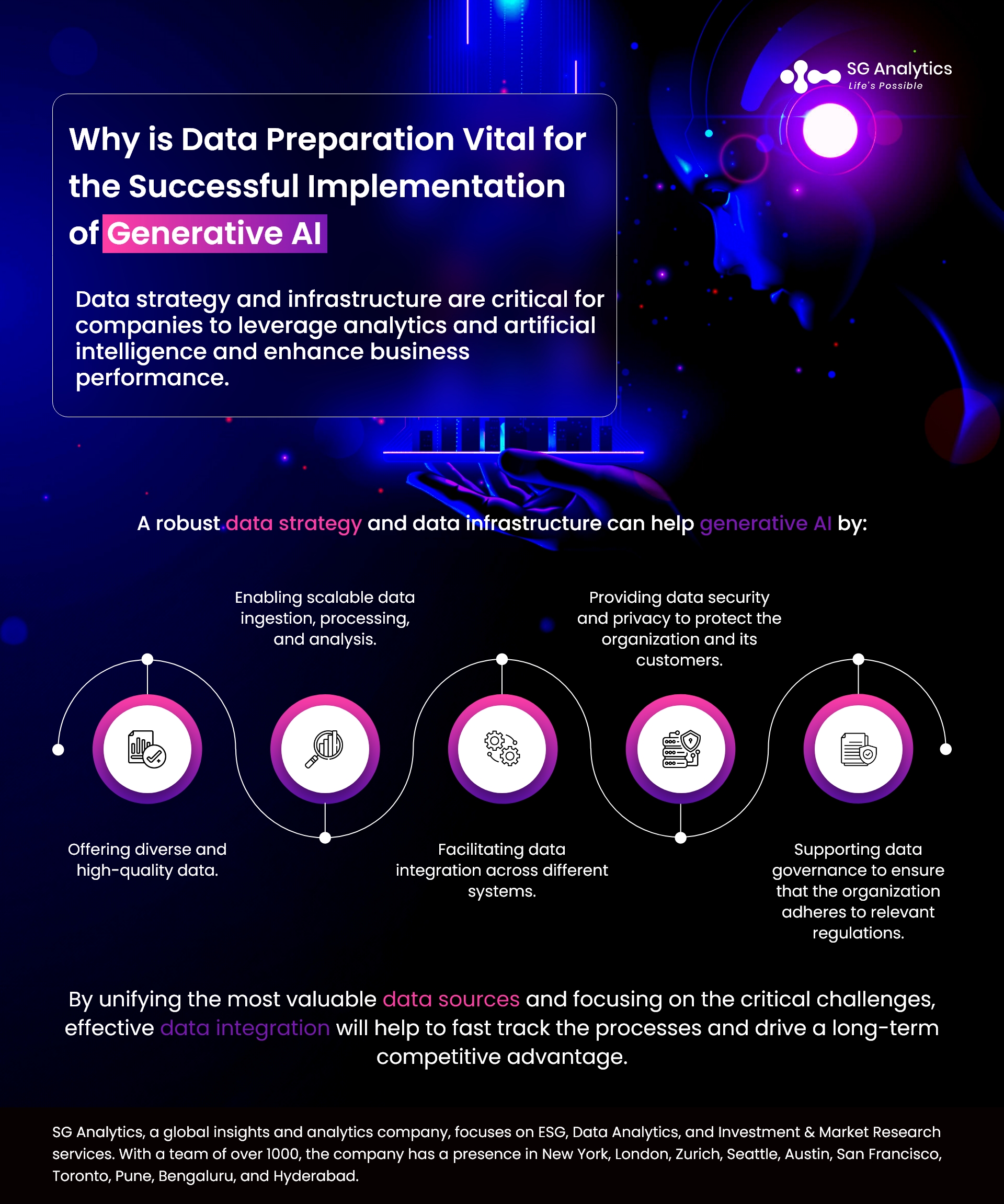Industry leaders today are concerned about whether their enterprises can handle the data influx required to make the most of generative AI.
Many forward-thinking companies are evaluating and deploying predictive analytics, generative AI applications, and machine learning. However, success requires well-defined data pipelines, highly enriched datasets, and robust data platforms to power the ever-evolving AI landscape.
Building a Strong Data Foundation
Data strategy and infrastructure are critical components required for companies to leverage the power of analytics and artificial intelligence to enhance business performance and customer experience. Meanwhile, business leaders are keen to utilize data analytics and AI to enhance their workstreams as well as to deliver tangible business benefits. However, it is critical to establish a strong foundation with engaged technology and data teams to reap the benefits.
Read more: Integrating the Power of Generative AI for Transformative Leadership
The foundation of any successful AI model is a robust, well-integrated, and meticulously managed data platform. Auditing, integrating, and transforming existing data is critical for an effective deployment. However, this critical preparation step is overlooked when teams are busy working on model building.
Identifying Organization's Data Sources
What data sources do businesses have? And where are they located, in the cloud or on-premises? Businesses need to identify and understand the dependencies that exist between data sources and data flow systems. Let's explore the four-step guide to accessing and reading these data sources.
-
Identify data sources: Data sources should include databases, file systems, cloud storage, APIs, and unstructured data like emails or documents. Every department, including marketing, sales, or engineering, should have a record of their unique domain-specific data sources.
-
Catalog and classify the collected data: For every data source, organizations need to document the type of data the set contains. By classifying the data based on sensitivity, regulatory requirements, and business priorities, organizations can implement generative AI tools to organize their data.

-
Assess data quality: Organizations need to evaluate the quality of data with respect to accuracy, completeness, consistency, and reliability. This step is critical to determine the usability of the data and the relative priority of the data stream.
-
Document data usage: Organizations need to record the way data is accessed and its purpose. This helps to identify dependencies and bottlenecks.
Read more: Top Generative AI Tools to Keep an Eye On: Embracing Transformative Innovation
Integrating Data Sources into Central Repository
Organizations need to store all the disparate data sources in a single place so that AI and machine learning applications can use all ofall their data in context. Every additional data source should be fed into the central repository in the LLM or machine learning model.
Effective data integration further ensures that data is not only centralized but also accurate and updated regularly. Building custom data movement tools can be time-consuming and complex. On the contrary, rebuilt data integration solutions can offer advanced features and scalability.
Keeping the data store in sync with incoming data sources is critical yet challenging. This helps to ensure that the collected data is current and accurate. This approach helps capture and integrate changes made to the data in real time and maintains relevance and accuracy.
Ensuring the Collected Data is Private, Secure, and Compliant
It is vital for businesses not to neglect the significance of data security across the process. Data in motion is much more vulnerable than data at rest.
Industries such as healthcare with strong data privacy laws need to implement precautionary measures and ensure that they have the specific certifications required for end-to-end encryption along with private networking and data processing options. This will help in further enhancing cybersecurity posture and ensuring regulatory compliance.
Read more: Catalyzing Innovation in Workplace Safety with Data Analytics and AI

Once the process of safely moving the data into a central repository is completed, the next critical step is transformation. This involves identifying relevant text fields and isolating them in different datasets used for processing. For machine learning models, this involves merging complementary datasets, joining tables to deliver flat datasets, and using engineering to make model training more effective.
At this step, it is equally important to validate data quality independently. Feeding more data in the models only helps if the data is reliable. If not, organizations might risk polluting datasets and reducing the accuracy of the model.
For Businesses: AI is as Good as Data
When it comes to AI, businesses often find them at a rare inflection point. While AI is not new, and many organizations are making predictions, generative AI is expected to grow further. Companies will have to differentiate the experiences they build for customers with AI from those that risk falling behind.
A robust data strategy and data infrastructure can help generative AI by:
-
Offering diverse and high-quality data that can be used to train different generative AI models.
-
Enabling scalable data ingestion, processing, and analysis to support the complex nature of generative AI applications.
-
Facilitating data integration across different systems to enhance the accuracy of generative AI outputs.
-
Providing data security and privacy to protect the organization and its customers from potential risks and liabilities.
-
Supporting data governance to ensure that the organization adheres to relevant regulations and standards.
Read more: 2024 Outlook: Generative AI and the Future of Work

Generative AI enables organizations to optimize their insights into diverse data sources, including customer data and risk assessments. These insights further help improve decision-making regarding pricing and fraud detection. For businesses to ensure AI applications are more precise, intelligent, and impactful, a trusted data infrastructure with consistent, real-time, and consented data is critical.
With so much unknown, AI is only as good as the customer data.
For customer engagement, AI intelligence should be trained on customer data. If the customer data is siloed, inconsistent, or incomplete, the most innovative AI applications will witness less impact. Success depends on having the best-trained model.
In the next decade, AI will likely impact humanity, and for that, organizations need to work together to unleash their true data potential. But with everything moving rapidly, it can be difficult to know where to start. Organizations also need to work towards protecting customers from harm by understanding customers through their data. Using generative AI, it is achievable to input natural language queries.
Building a strong foundation for AI-ready can help guarantee that the AI models are fed the most accurate and timely data available to deliver appropriate results. By unifying the most valuable data sources and focusing on the critical challenges, effective data integration will help in fast-tracking the processes and driving a long-term competitive advantage.
SG Analytics, recognized by the Financial Times as one of APAC's fastest-growing firms, is a prominent insights and analytics company specializing in data-centric research and contextual analytics. Operating globally across the US, UK, Poland, Switzerland, and India, we expertly guide data from inception to transform it into invaluable insights using our knowledge-driven ecosystem, results-focused solutions, and advanced technology platform. Our distinguished clientele, including Fortune 500 giants, attests to our mastery of harnessing data with purpose, merging content and context to overcome business challenges. With our Brand Promise of "Life's Possible," we consistently deliver enduring value, ensuring the utmost client delight.
A leading enterprise in Generative AI solutions, SG Analytics focuses on unlocking unparalleled efficiency, customer satisfaction, and innovation for the client with end-to-end AI solutions. Contact us today to harness the immense power of artificial intelligence and set new benchmarks in operational efficiency, customer satisfaction, and revenue generation.
About SG Analytics
SG Analytics is an industry-leading global insights and analytics firm providing data-centric research and contextual analytics services to its clients, including Fortune 500 companies, across BFSI, Technology, Media and entertainment, and Healthcare sectors. Established in 2007, SG Analytics is a Great Place to Work® (GPTW) certified company and has a team of over 1100 employees and has presence across the U.S.A., the U.K., Switzerland, Canada, and India.
Apart from being recognized by reputed firms such as Analytics India Magazine, Everest Group, and ISG, SG Analytics has been recently awarded as the top ESG consultancy of the year 2022 and Idea Awards 2023 by Entrepreneur India in the “Best Use of Data” category.









